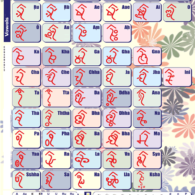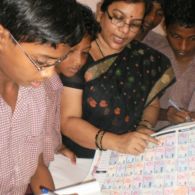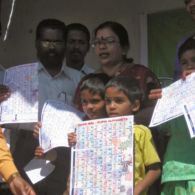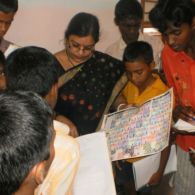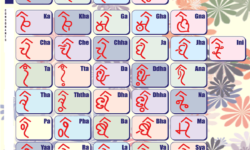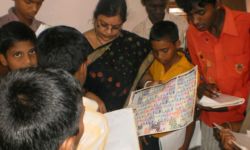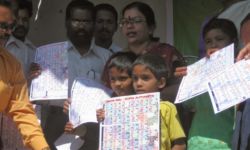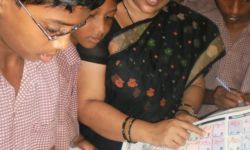Profile
Kupia is one of nearly twenty scripts created by Dr. Prasanna Sree for indigenous and minority groups, mostly in Andhra Pradesh. In each case, the design of the script reflects some iconic feature of the culture of that linguistic community. She writes:Kupia is an Indo-Ayran language related to Odia and spoken by about 6,600 Valmiki people in the Indian state of Andhra Pradesh. The Valmiki are a tribal group, concentrated in the Agency Area of Hyderabad, Srikakulam, Vizianagaram, East Godavari and Visakhapatnam districts.
Valmika or Valmiki is a name assumed by the Boyas and Paidis, who claim to be descended of the great sage Valmiki, the author of the Hindu epic Ramayana.
The Valmiki population in the area is 142,944 according to the 1981 Census. They usually live in multi-tribal villages along with other tribal groups, like the Bagatha, Gadaba, Konda Dora and Porja. They speak their own language, Kupia, as well as the regional language Telugu and Kunchubuchi, a dialect of Odia.
The literacy rate is comparatively higher among the Valmiki compared with other tribes in the agency area, even though boys from poor families generally drop out of school to support their families and girls are not encouraged to go on to higher education.
The Kupia script has its roots in Indian mythology. Ratna Kardah was a thief and a bird hunter. One day he shot an arrow at two pigeons, and one of the birds fell dead. The sight of the surviving pigeon in tears beside her dead partner made the thief regret his crime. He was so consumed by remorse that he did not notice a vast ant hill, called Valmikam, grow up around him. God appeared and instructed him to write the great Indian epic Ramayana. The holy sage was named as Agni Sharma, and after his emergence from the ant hill, or Valmikam, he was known as Valmiki. The language his descendents spoke was the Kupia language of the Valmiki tribe. Hence their script is designed around the form of a bow and arrow.
You can help support our research, education and advocacy work. Please consider making a donation today.

